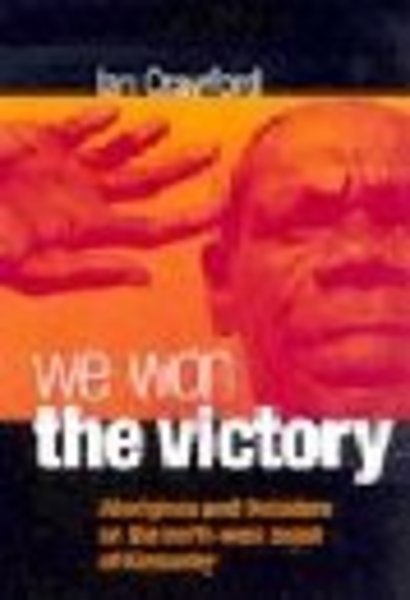ABORIGINAL
West Australiana
A fascinating account of the contact between the Aboriginal inhabitants of the North-West Kimberley and various intruders – from Indonesian fishermen, white explorers, pearlers, pastoralists. pp. 335 illusts First Edition SCARCE 335 p. : ill., maps, ports. ; 21 cm #0319R/251023/200424
“We Won the Victory tells the story of contact between the Aboriginal people of the north-west Kimberley coastal region and various intruders upon their land. These include ‘Indonesian’ fishermen, white explorers, pearlers, pastoralists, beachcombers, missionaries and the military. At the centre of the book are the Aboriginal stories of those events, but Ian Crawford also draws on written evidence to give context to the events.” “In both Aboriginal and white accounts, actual events are generally agreed but the causes and motives of whites were interpreted by Aboriginal people in ways quite different to those in the white record. Often a basic Aboriginal conclusion was that white people were untrustworthy. For the author, understanding why Aborigines formed that view is important if Australians are to move on with the process of reconciliation.”.
“We Won the Victory is a fascinating and engaging work of the history of a part of Australia where there has been contact by the Aboriginal people with many outsiders over the centuries. There have been many mutually positive contacts, and many negative over that time, and many battles were fought, some lost, some won, but in the end the Aborigines remain, still in control of their land and culture.”
“We Won the Victory tells the story of contact between the Aboriginal people of the north-west Kimberley coastal region and various intruders upon their land. These include ‘Indonesian’ fishermen, white explorers, pearlers, pastoralists, beachcombers, missionaries and the military. At the centre of the book are the Aboriginal stories of those events, but Ian Crawford also draws on written evidence to give context to the events.” “In both Aboriginal and white accounts, actual events are generally agreed but the causes and motives of whites were interpreted by Aboriginal people in ways quite different to those in the white record. Often a basic Aboriginal conclusion was that white people were untrustworthy. For the author, understanding why Aborigines formed that view is important if Australians are to move on with the process of reconciliation.”
Full contents:
1. Enjoying the Journey
2. Kalumburu
3. Mary and Her House
4. The ‘Indonesians’
5. The Explorers
6. The Juarinanda
7. Camden Harbour
8. The Pearlers
9. Narrin and the Pastoral Experience
10. The Missions
11. Beachcombers and Other Strays
12. The Japanese War
13. Return to Kinganna
14. Understandings, Old Ways and New
15. Our Lady’s Feast Day
